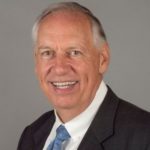
Drollinger: Christians, Don't Live in Spiritual Poverty - Enjoy What God Has Given Us
An unknown author told the story of Julian Ellis Morris, a rich English eccentric who liked to dress like a tramp and sell razor blades, soap and shampoo door to door.
After a day’s work, he would return to his beautiful mansion, put on formal attire and have his chauffeur drive him to an exclusive restaurant in his limousine. Sometimes he would catch a flight to Paris and spend the evening there.
The author makes the point of this week’s study: Many Christians live something like Mr. Morris, spending their day-to-day lives in apparent spiritual poverty, only occasionally enjoying the vast riches of glory that their heavenly Father has given them.
How tragic to go around in the tattered rags of our own inadequacy when we could be living sumptuously in the superabundance of God’s unspeakable riches, this author wrote.
This week’s Bible study, “How to Be Strengthened with His Power in Office,” examines, through the Scriptures, how we may live sumptuously in the superabundance of God’s unspeakable riches.
A great passage of Scripture is found in Ephesians 3:16-17: “That He would grant you, according to the riches of His glory, to be strengthened with power through His Spirit in the inner man, so that Christ may dwell in your hearts through faith.”
The passage is a prayer of Paul’s. He is praying the following: “Lord, give believers the capacity to know all of what they have in Christ so that these Ephesian believers will come to grips with the immense prosperity made available to each one of them — and to every other believer — through their faith in Christ!”
Like many today, the Ephesian believers had a limited understanding of what belonged to them because of their salvation in Christ.
Paul begins his “that He would grant you” prayer with a tautological style like his first prayer in Ephesians 1:17-18, which states, “That the God of our Lord Jesus Christ, the Father of glory, may give to you a spirit of wisdom and of revelation in the knowledge of Him. I pray that the eyes of your heart may be enlightened, so that you will know what is the hope of His calling, what are the riches of the glory of His inheritance in the saints.”
Tautology is the repetition of an idea. In other words, Paul is being redundant, conveying the same thought repeatedly for the purpose of emphasis.
Both prayers may give you similar ideas. Paul’s praying in both passages reveals that he’s interceding for the Ephesians (cf. 3:14), asking God to grant and give, respectively. Note more precisely that Paul is not praying that God would grant and give as if they did not already possess these things (cf. Colossians 2:10). Rather, context suggests that he is praying God would grant and give in a way that befits what has already been bequeathed by him and exists in the believer at the point of salvation.
Notice the ways Paul describes what has been granted to the believer. First, what has been granted is “according to the riches of His glory,” indicating that the believer is empowered with strength corresponding to the One giving it.
Paul prayed that believers would be “strengthened with all power, according to His glorious might” (1:11). The granter of strength is able to provide abundant strength corresponding to his capacity! How? God grants “according to the riches of His glory”!
Now add to this the last aspect of the stanza: God grants in accordance with his glory. Philippians 4:19 states the same idea stereophonically: “And my God will supply all your needs according to His riches in glory in Christ Jesus.” His glory is the summing up of all his attributes, character and manifest actions.
The believer is strengthened in accordance with all of this! It follows, then, that Christians who understand these profound truths should exhibit more character, strength and resulting fruitfulness in our personal and professional lives than unbelievers, or believers who are naive to their standing in Christ.
Having substantiated the credible and omnipotent source of power available to and in the believer’s life, Paul continues his prayer, now describing God’s desired destination for all that indwelling power. We have already foreshadowed this destination in our study — and that is for all believers to be “strengthened with power through His Spirit in the inner man.”
A relationship is found throughout the New Testament between the Holy Spirit and the believer’s empowerment because strengthening with power is one of the Holy Spirit’s ministries. This idea is normative for the believer. The following passage underscores this idea:
“But you will receive power when the Holy Spirit has come upon you; and you shall be My witnesses both in Jerusalem, and in all Judea and Samaria, and even to the remotest part of the earth” (Acts 1:8). (cf. Romans 1:4, 1 Corinthians 2:4, 1 Thessalonians 1:5)
It follows that the believer should not grieve or quench the Holy Spirit who indwells him at the point of his salvation (cf. Romans 8:9). To grieve or quench the Holy Spirit is to cut off your power supply!
Paul specifically states this idea later in his letter to the Ephesians when he writes in 4:30, “Do not grieve the Holy Spirit of God, by whom you were sealed for the day of redemption.”
When this fusion occurs and is consistent over a period of time, there are outwardly identifiable characteristics. Galatians 5:22-23 calls these characteristics the fruit of the Spirit: love, joy, peace, patience, kindness, goodness, faithfulness, gentleness, self-control.
Walking in the Spirit, being empowered by the Holy Spirit, always equates to the believer’s increasingly manifesting his attributes, character and actions!
Lastly, this indwelling in the heart is through faith.
A synonym for faith is trust. In other words, as we trust him, he makes our hearts his home.
The implication of the apostle’s prayer is that the more the Spirit empowers one’s life, the greater will be one’s transformation into the likeness of Christ. As believers, we will be strengthened with his power to the degree that we are obedient to the will of God. It is directly proportional.
May God use this lesson in your life in a wonderful way, my friend. Click here to read the full study.
The views expressed in this opinion article are those of their author and are not necessarily either shared or endorsed by the owners of this website. If you are interested in contributing an Op-Ed to The Western Journal, you can learn about our submission guidelines and process here.
Truth and Accuracy
We are committed to truth and accuracy in all of our journalism. Read our editorial standards.
Advertise with The Western Journal and reach millions of highly engaged readers, while supporting our work. Advertise Today.












